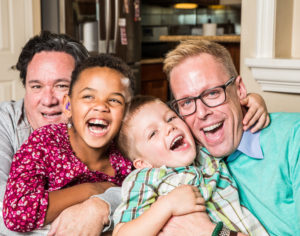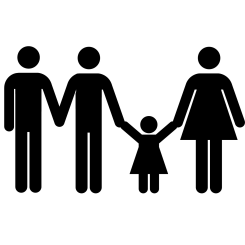
LGBT Family Planning involves conscious decision making and careful preparation to ensure that your family is protected under existing laws, which are evolving every day.
LGBT family planning is crucial to provide the security that your family deserves. While many more options exist for us to consider when creating our families, each one carries with it particular considerations which will inform and facilitate your choice. Here are a few options:
Adoption
There are over 130 adoption agencies in New York State, and each of the 58 social services unit districts has an adoption unit. There are no fees for adopting children who have special needs or are in custody of the local social services commissioner, although there may be fees for adopting those children in the legal guardianship of local voluntary agencies. The fees are based on the adoptive family’s income, however, and help may be available in the form of grants or fee waivers, so don’t let finances put you off from looking into this as an option to start your family.
After deciding on an agency, the application forms must be completed. Information is taken about your current family, your background and the type of child you feel you would be able to give the best life to. Criminal history checks will also be made, with particular attention paid to whether someone in the prospective adoptive family’s home has previous mistreated or neglected a child. A criminal record does not necessarily mean that you will be refused for adoption, as it depends on several factors including the type of crime committed.
Within four months of submitting the application, a home study is started and carried out on the prospective adoptive family. This is a series of meetings, training sessions and interviews that enables the family and social services to ascertain the readiness of the family to adopt, and any issues that they may need help with. After the home study has been completed the caseworker writes a summary about the family, which the adoptive couple can also add comments to. Training is also required to cover some areas that are specific to adoptive parenting, such as the needs of foster children and what kind of child they would be most suited to as a parent. At this point, the couple, or individual, is considered “Pre-Certified” to adopt.
Once the study and summary are complete, the work then begins to match the family with a child. There is no set process for this as it is individual according to the child’s situation and needs. The Family Adoption Registry provides information about waiting children, and adoptive parents can ask for more information about children they are interested in, in exchange for a copy of the home study. The process goes from there and hopefully ends with a child or children finding a loving home with their new parents!
Children from a Pre-Existing Relationship
If you are in a relationship where your partner or spouse has a child from a pre-existing relationship, the process by which you may secure legal rights to the child is called Second or Step Parent Adoption. If the child has another living legal parent, this process will require that the other parent either surrenders their parental rights to the petitioning parent, or that their rights are terminated by the Court.
Lesbian Couples and Sperm Donation
One of the most cited reasons for choosing known sperm donors is to have a greater insight into the biology of your child. Having a known sperm donor’s medical history can be critical for mothers who have medical or genetic issues that they must consider before having a child. An anonymous sperm donor file will provide some medical information, but a known donor can share his family medical history, which may be crucial for the health of your child. 
The key for a successful selection of a known donor depends on several factors, all personal to the couple or individual. One crucial consideration for individuals considering a known donor is that the donor CANNOT surrender his parental rights and will be able to sue for custody and visitation to any child born through such an arrangement. Each state has different laws, but most favor a child having two legal parents.
Lesbian couples considering a known donor should always enter into a Known Donor Agreement prior to any attempts at insemination. This agreement will spell out the details of understanding between the intended parents and the donor, including the donor’s intent to surrender his parental rights to the non-birth mother.
While medical considerations are one of the top reasons for having a known donor, knowing the emotional and social character of the donor is also an often overlooked consideration in many people’s path to parenthood. No anonymous donor profile can show the complete picture of the person who may be the biological father of your child.
Legal considerations are also important reasons to choose between anonymous donors and known sperm donors. Anonymous donors surrender their parental rights to any children born with their genetic material upon deposit to a sperm bank or fertility clinic. When you choose an anonymous donor, they may offer the option of allowing the child to contact them at age 18, but there is no question as to their lack of parental rights to that child.
Surrogacy
Surrogacy is the process by which a woman carried the child, or children, of the intended parent/s. Male couples often see this as the most viable method of LGBT family planning.
Currently, only 5 states ban compensated surrogacy, New York being one of these states. New York does allow for compassionate surrogacy, where the surrogate mother, or carrier, is not compensated for the risks, dedication and disruption to their lives when having a child for someone else. Traditional surrogacy is where the surrogate mother, or carrier, is also the egg donor. Gestational surrogacy is where a separate egg donor exists and the carrier has no biological relationship with the child born through surrogacy.
It is imperative that if you choose surrogacy to help you have your family, that you do so in an ethical manner and make conscious choices about how to go about the process. It is also a wise choice to research perspective agencies and fertility clinics thoroughly and ask a lot of questions.
Once your child is born through surrogacy, it is critical to secure the legal rights of the non-genetically related parent through both a pre or post birth order in the state where the child is born and a confirmatory second or step parent adoption back in the home state of the intended parents. A pre or post birth order is a court order that terminates the parental rights of the surrogate mother and, in some states, establishes the rights of the intended parents. There is evolving, and in some cases, conflicting, case law about whether the confirmatory adoption is required when a pre or post birth order exists; however, there is nothing more important than ensuring that your family is completely and securely protected.
Co-Parenting
Many single LGBT and non-LGBT individuals are choosing to co-parent. Co-parenting may be the latest frontier in the world of LGBT family planning This is defined as two individuals who are not in an emotional relationship, choose to raise a child together and share parenting responsibilities. This process also requires a carefully considered Co-Parenting Agreement to spell out the intentions of the co-parents and their responsibilities to the child and to one another. Many websites exist today to connect those interested in co-parenting but it is critical that anyone considering this option visit a family law attorney who is versed in the intricacies of co-parenting.
Once you have your family plan in place, remember to protect that family with careful and considered estate planning. If unmarried, you may also consider the benefits of a pre-marital agreement to define separate and joint property.
LGBT family planning can take many forms. With so many LGBT family planning options available to couples and individuals, take your time and figure out which one is right for you. If you have any questions at all about these processes, please visit www.timeforfamilies.com or email me at Anthony@timeforfamilies.com.
Contact Time For Families
The post LGBT Family Planning – The ABCs of Family Creation and Protection appeared first on Time For Families.
Source: Time for Families












